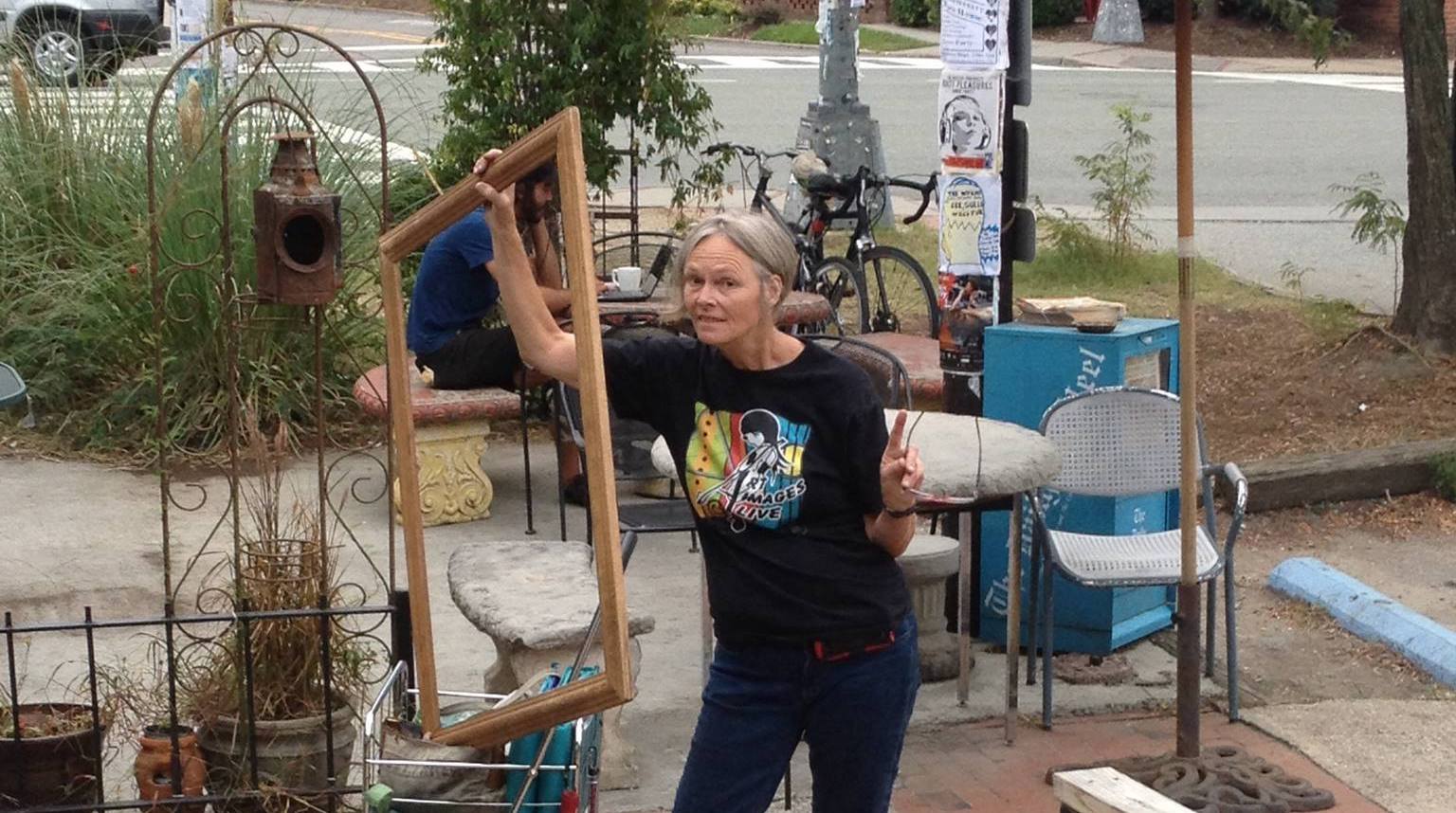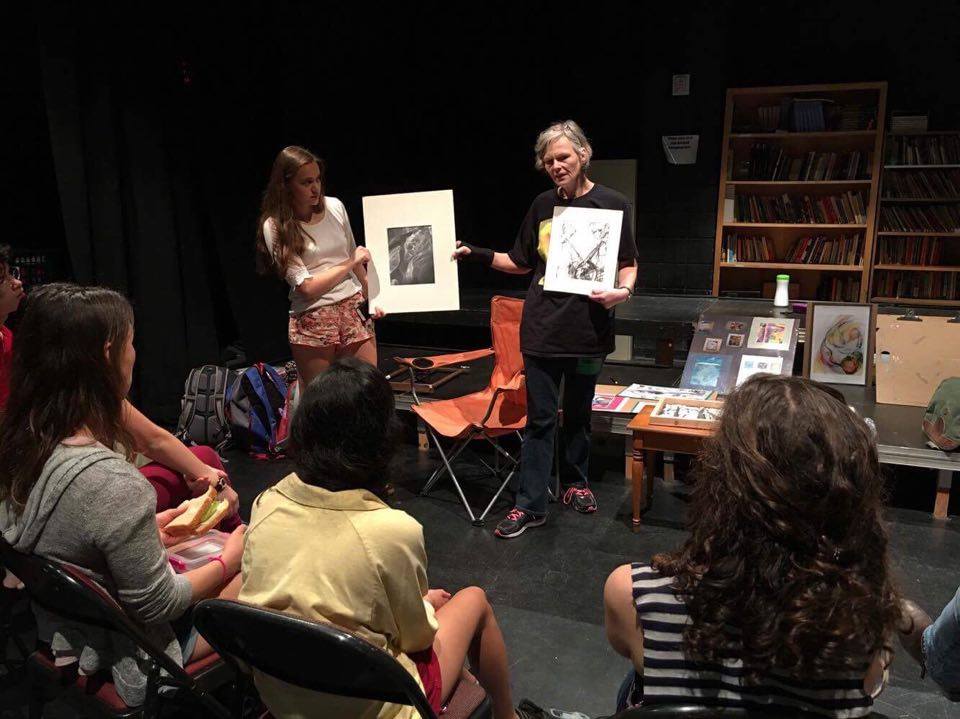Barbara’s Story: Service to Others

Barbara is an artist who lives in Carrboro, North Carolina. She is an active member of her church and a volunteer in her community.
Who lives in your household?
Just me. I have four grown children, but one of my sons Joel died a year ago in February.
That’s part of why I’m paying off debt – for me to be able to stay with Joel at different stages of his treatment, surgeries, and dying. It pushed me to my financial limit, but no one wants to die alone, and I didn’t want that for him. My debt was also related to three funerals and being with family members prior to their deaths. After my son died, it took a few weeks to clean up his rental property and hold a memorial.
I’m blessed to have a really good church community, which helps me. I’m not in over my head right now, but on my income, it’s taking everything I’ve got to pay back my debt. I live off donated food after my EBT runs out. It’s something I worry about every day. I know that the only way I can continue is if it’s God’s will for me.
What do you do?
I’m 65 and I’ve been disabled for a long time, since 2004. I have SSI and SSA, but I am on the low end of it. I have Section 8 and EBT, which is $130/month, and I get energy assistance.
I’m trying so hard to work out a budget and live within my means if there is a way to do it.
What did your upbringing teach you about finances?
My parents were out of the Depression era. They always tried to live off the land. They knew from the Depression that if you didn’t own your own property and have cash under your mattress, you had nothing.
I was one of the first in my family to ever finish high school or go to college. They wanted for me not to have to work as a child because they both lived through tremendous deprivation as children.

I’m 65, and I’ve been doing art since I was 6. My father was a photographer, and my mother was an amazing artist. They were both untaught and became medical photographers and artists for Dartmouth College. It wasn’t a hippie thing. They were blue collar workers and could barely get by.
Growing up, they encouraged me to go out and do what they weren’t able to do. Even though they didn’t have money to pay for it, I earned money to pay for my own ballet lessons and arts and crafts.
What have been your lowest and highest financial points?
I don’t think I’ve ever had a high financial point. I’ve always lived in extreme duress and poverty. I’ve lost everything and been homeless.
In my 50s, I had Hepatitis C, I had severe depression, and had just come out of homelessness. I had to start over. I had to have another spinal fusion and had to go through treatment of Hep C, which I got from my husband. Then I couldn’t get treated for Hep C until I got the spinal fusion, and I was really sick for a long time. I got knocked down again and again.
The Hep C treatment was very hard and lasted a year. It was hard to get back in to art after that. I didn’t know how to reach out for help. I had given up on myself, and that’s the heart of addiction.
In the first six months of my sobriety, I faced my father’s death, my husband’s death, and the beginning of my son’s first major health problems. My son was previously a serious heroin addict, but he was sober for five years. He was diagnosed with untreatable life-threatening bacteria related to the use of needles. Over the following year he had to have a heart transplant and he had congestive heart failure and kidney failure. We went through these experiences together and stayed sober. Deep inside me, the spiritual reality and love of God took me out of the darkness. Some people call addiction the Dark Night of the Soul.
The spiritual and physical lessons I learned from sobriety are cornerstones for me to live with a current diagnosis of focal point dysphoria, which is a brain related movement disorder. We never know how much time we have and together we can make our lives better. The SaverLife program is a glimpse of hope because it provides matching funds and resources. I hope my story can help someone else can find inspiration or confirmation. Living within our means is important as we see our neighbors who seem to have a better material life.
What’s the best piece of financial advice you’ve received?
Not that I’ve always lived by this, but my favorite advice is “live within your means.” It’s a spiritual as well as financial quest for me. One of the best things you can do is buy your own land and pay it off.
I am trying to create a budget that’s truly realistic for my daily needs. It takes spiritual discipline because I can’t rely on old habits or impulses. I’m a Christian, and it’s about thanking God first instead of reacting on emotion. I am trying to focus on what I do have. I need to trust that there is another way without asking impulsively what it is.
What are your goals for the future?
My main goal is to do something of value to help someone else and be of service to other people. I’m a member of churches, a member and volunteer of Interfaith Counsel, and I volunteer as a Special Olympics swimming coach.
It’s less about what I want, and more about what others need from me, to be able to be there, be present, and lift others. All you really need to do is be present and listen.
I hope to volunteer with women while they are in prison or jail and after they get out. For me, transition is the most difficult aspect of change. Hopefully my experience may be helpful to them. After fourteen years of surgeries, being homeless, having no credit, work, or friends, I became aware of many resources within my community. I started actively participating with groups or programs that helped me. Now my hand is available to others trying to better their lives. I am not paid for this work, but it’s a full-time job.
I want to make sure I leave this life with my debts paid and my apartment cleaned out, hopefully my burial paid for, and some means for my family to get together to celebrate life.
What does money mean to you in your life?
It doesn’t. I’ve learned that you earn your way through life. Nothing is free. We’re expected to take the gifts we are given and do the work we can do. If I can’t make ends meet, having more money may not fix that.
I hope that if your readers can read this and learn about my experiences, they don’t need to go through some of the struggles that I’ve been through.